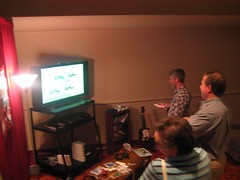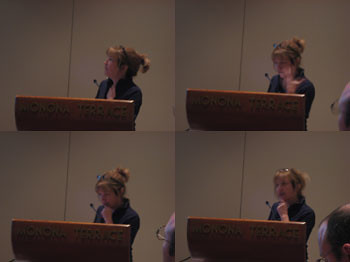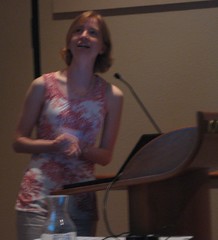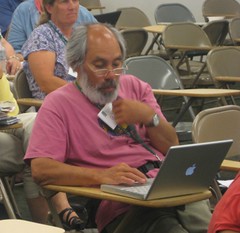Summer time use to be dull and boring for those of us who spent work hours on the Internet. Teachers went home, schools closed, and Net traffic slacked. That’s all changed now. Think back to a couple of weeks ago, to the National Educational Computer Conference, and the almost constant stream of blog postings that emanated from that even and from people who were responding to that conversation from points around the globe. Technorati logs 833 blog posts tagged with necc07. Google Blog Search lists 1,119. Flickr hosts 2,131 uploaded photos tagged with necc07 or with necc07 in the title or description of the photo.
This week, we have a double whammy, two amazing conferences, neither of which I will be attending, but both of which I will be watching. Alan November’s Building Learning Communities, which starts today (or by all accounts yesterday), and the Lausanne Collegiate School Laptop Institute, which started yesterday. You can follow the Laptop Institute on Hitchhikr at http://hitchhikr.com/?id=137, and BLC at http://hitchhikr.com/?id=167.
I really couldn’t help but chuckle, when Steve Dembo Twittered for someone to try to Skype him while he was on the BLC cruise. Then almost immediately Twittering again, “Stop Stop, Please Stop!” as people were pinging his Skype account from all over the world…
But that’s not what this post is about. Last week saw some pretty exhilarating mind activity at the Games + Learning + Society conference in Madison, Wisconsin. While there (literally), I had the pleasure of sitting with Jenny Levine (The Shifted Librarian), Glenn Webe (History Tech author and social studies consultant at ESSDACK), and Cynthia (don’t remember her last name), who is a professor at a university in Chicago. At the end of our lunch, I recorded a conversation we had about our reactions to the conference and especially about the upcoming ALA conference on video games in Chicago (wish I could be there). Hopefully this recorded file will survive the repairs currently being done to my Mac and will appear as a podcast sometime soon.
At the end of our conversation, I asked, “What has surprised you at this conference?” Glenn, whom I respect and who has contributed a great deal to the conversation about video games in education, expressed a disappointment that although the conference explicitly advertised itself as a games and education conference, very little was shared about integrating video games into our classrooms. We all agreed, and this issue was brought up on several occasions during sessions I attended.
 However, I’d like to take another stab at this idea from a different direction (my forte). If we look at efforts to apply games to education as a bridge we are building between the island of video games and the island of today’s classrooms, I suspect that video games, as discussed at the GLS conference, have pretty much built half of that bridge. Enough evidence has been generated that video games can help students learn a variety of skills and content and how that happens.
However, I’d like to take another stab at this idea from a different direction (my forte). If we look at efforts to apply games to education as a bridge we are building between the island of video games and the island of today’s classrooms, I suspect that video games, as discussed at the GLS conference, have pretty much built half of that bridge. Enough evidence has been generated that video games can help students learn a variety of skills and content and how that happens.
Perhaps it is our part to close the gap, to build the rest of the bridge, to think about, talk about, and work toward restructured classrooms and learning experiences that can adaptively harness the power of video games for the sake of learning standards that are relevant to our children’s future.
This is not merely a suggestion for teachers. This challenge applies to principals, central office administration, state departments of education, school boards and superintendents, legislators, and a caring visionary national leadership — and even the students. We have to move into the 21st century, not just sit back and wait for the 21st century to recognize us.
Image Citation:
Louie, Steve. “Fremont Bridge.” The_get_up_kid’s Photostream. 16 July 2007. 16 Jul 2007 <http://flickr.com/photos/stevelouie/826713868/>.


 I just sat through a session of presenters that, although they each shared interesting and valuable information, was disappointing, because we did not have time in the end to ask the questions that the entire session was intended to teach — what we learned in the process of developing our games. The presentations were mostly about the games.
I just sat through a session of presenters that, although they each shared interesting and valuable information, was disappointing, because we did not have time in the end to ask the questions that the entire session was intended to teach — what we learned in the process of developing our games. The presentations were mostly about the games. I’m going to try to explain this and I may not get it right. If this doesn’t send chills, then I guess you had to be there. During one of the panel presentations, yesterday, a 17 year old looking fellow,
I’m going to try to explain this and I may not get it right. If this doesn’t send chills, then I guess you had to be there. During one of the panel presentations, yesterday, a 17 year old looking fellow,  Here are a few quotes from the GLS conference for your consideration. They struck me at some subterranian level and I’m not sure why. I suspect that there may be something important to us, or maybe not.
Here are a few quotes from the GLS conference for your consideration. They struck me at some subterranian level and I’m not sure why. I suspect that there may be something important to us, or maybe not.  What I seem to read in in his examples was an insistence among educators — traditional and progressive — to work toward final products. Instead of a book report or a graph in colored pencil, it’s a video or a podcast. In RL, so much of what we do never really gets finished. For that mater, what do we ever start from scratch. It’s all ongoing. It’s all conversation.
What I seem to read in in his examples was an insistence among educators — traditional and progressive — to work toward final products. Instead of a book report or a graph in colored pencil, it’s a video or a podcast. In RL, so much of what we do never really gets finished. For that mater, what do we ever start from scratch. It’s all ongoing. It’s all conversation.
 A grand day in Vermont yesterday. I did my session on Web 2.0 to School 2.0, and it seemed to resonate. I did it a few weeks ago for the SETDA group at the Leadership Symposium at NECC for the first time and talking about the differences between Web 1.0 and Web 2.0, within the context of teaching and learning (1.5 ;-)) seems to resonate right now. So it was a fun session to do yesterday, and then to interact with the leadership teams as the continued to vision and continued their plan writing was a real treat.
A grand day in Vermont yesterday. I did my session on Web 2.0 to School 2.0, and it seemed to resonate. I did it a few weeks ago for the SETDA group at the Leadership Symposium at NECC for the first time and talking about the differences between Web 1.0 and Web 2.0, within the context of teaching and learning (1.5 ;-)) seems to resonate right now. So it was a fun session to do yesterday, and then to interact with the leadership teams as the continued to vision and continued their plan writing was a real treat. This was waiting in my e-mail box this morning, posted by a prominent clothing fashion store in a mall near you. It spouts in white, red/orange, and blue text,
This was waiting in my e-mail box this morning, posted by a prominent clothing fashion store in a mall near you. It spouts in white, red/orange, and blue text,  I had a good day at the LEAD-IT conference, where school district teams, consisting of a superintendent, tech director, tech integrator, and school board member from across Vermont are meeting and working together to write action plans for moving their schools into the 21st century. There were lots of conversations and an excellent presentation on education and project-based learning from Jim Moulton during the day. Yesterday evening, Bernie Dodge did a great presentation about technology trends and learning with technology. He described his formula for learning power:
I had a good day at the LEAD-IT conference, where school district teams, consisting of a superintendent, tech director, tech integrator, and school board member from across Vermont are meeting and working together to write action plans for moving their schools into the 21st century. There were lots of conversations and an excellent presentation on education and project-based learning from Jim Moulton during the day. Yesterday evening, Bernie Dodge did a great presentation about technology trends and learning with technology. He described his formula for learning power: